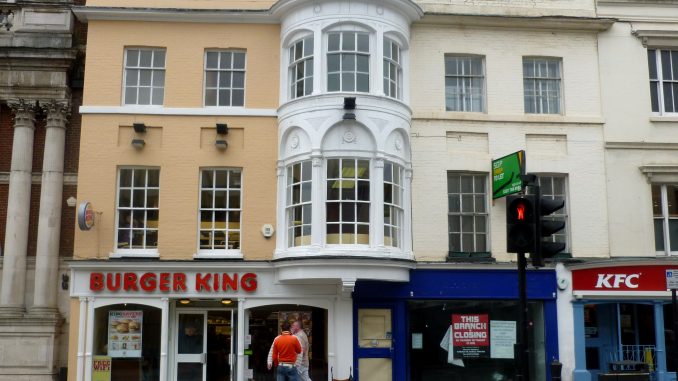
News of Amazon’s seasonal hiring of 20,000 temporary workers, reported in various UK news outlets this autumn, is generally heralded as good news for job seekers. The company is expanding. Surely good news all around?
Yet, in light of Amazon’s recent massive reduction in its corporation tax and repeated reports of poor working conditions in its fulfilment centres, one has to wonder if Amazon is all that good for the British economy. A recent report by the Centre for Economics and Business Research (CEBR) suggests that the UK’s brick-and-mortar booksellers, the retail outlets most at risk from ‘Amazonisation’, might be making a far greater contribution than the online retail giant.
Brick-and-mortar booksellers pay more tax than Amazon
The report, commissioned by the Booksellers Association, presents compelling evidence to this effect. For the financial year ending in 2016, UK booksellers generated turnover of £1.3bn. Amazon’s turnover for this time period was a bit higher, at £1.46bn. Yet, it paid just £7.4m in corporation tax, versus the £12m paid by the whole of UK booksellers.
Looking at the total tax bill for each, the report concludes that Amazon pays a rate of just 8p per £100 of turnover, while booksellers paid 91p. That means that brick-and-mortar booksellers pay a tax rate 11 times higher than that paid by Amazon.
That significant difference in total tax bill is due not only to Amazon’s diversion of taxable income but also to the preferable business rate that Amazon pays relative to brick and mortar retailers. Giles Clifton, head of corporate affairs for the Booksellers Association, pointed out in August that brick-and-mortar retailers pay £2.41 in business rate for every £1 of corporation tax. That’s as much as 17 times more than the rates paid by Amazon at its fulfilment centres.
It’s no wonder, then, that booksellers have been closing at a rate of 3 percent per year and that today, there are half as many bookshops in the UK as there were 11 years ago. Which is to say nothing of the impact on the high street, in general, of massive online retailers like Amazon, sited on remote industrial estates.
Given its tax advantages over high street sellers, it is difficult to fathom why the government chooses to effectively boost Amazon’s fortunes by cutting its business rates while punishing smaller, high street sellers by raising the business rates that they pay.
Brick-and-mortar booksellers provide more jobs, treat workers better
This is especially curious in the case of brick-and-mortar booksellers, who, according to the CEBR report, contribute more tax revenue than Amazon and provide more jobs. During the 2015-16 financial year, booksellers across the UK directly employed 24,400 people while Amazon’s UK operations employed just 14,118 (on average throughout the year, according to their 2016 annual filing with Companies House) (In both cases total jobs figures represent a mix of full and part-time roles.)
And while a worker at an Amazon fulfilment centre may earn a bit more (the starting salary of £7.65 per hour is slightly higher than that reported for a bookseller at Waterstones, for example), trade unions have pointed to extremely poor conditions of labour. Back in 2013, BBC Panorama produced an undercover documentary that revealed the intense stress experienced by Amazon workers in Swansea, the demanding physical labour and toll of ten-hour work shifts. Since then, reports have routinely surfaced of these ongoing issues.
In 2015, Elly Baker, the GMB’s lead officer for Amazon, spoke out in the media, saying, ‘We’re finding that people have work-related stress initially, and then as the pressure mounts they can get anxiety and depression related to that.’ On the physical side, Baker reported, ‘Employees are having muscular problems and joint problems because of the volumes of work and pressure on them to deliver.’
Most recently, in May 2017, a worker at Amazon’s Airport City location in Manchester reported more of the same and added that compulsory overtime during the pre-holiday peak season, resulting in 11.5 hour work days five days a week, generates in general exhaustion among employees.
It’s worth noting that Amazon invested in Manchester, at its Airport City logistics hub, because the development’s classification as an enterprise zone offered a significant discount on business rate. By opening a fulfilment centre there, Amazon had the possibility to save £275,000 over five years.
Government should demand more from Amazon
The UK government has given Amazon nearly £20m in direct corporate welfare over the last decade, significant discounts on business rate (relative to high street retailers), and has let it get away with paying an absurdly low level of corporation tax. In other words, the government and UK taxpayers have given Amazon a lot of substantial gifts, which is why it’s important to critically interrogate what the UK has received, in return, from Amazon.
The primary return would appear to be 15,000 jobs (an estimate of current figures in late 2017), many of which are paid below a real living wage level and are reportedly damaging to the mental and physical wellbeing of those who perform them. The secondary return appears to be an attack on the economic viability of brick-and-mortar retailers, the economic health of the high street, and ergo, loss of jobs in city and town centres across the UK.
The case of Amazon highlights a key problem at the heart of corporate welfare practices in the UK today: we need to consider not just the benefits but the potential negative impacts of public funding for private businesses. In this case, we have to take Amazon’s overall impact on society more seriously. And, we need to level the playing field rather than further skew it in the interests of already wealthy, corporate giants.
Nicki Lisa Cole, Corporate Welfare Watch



